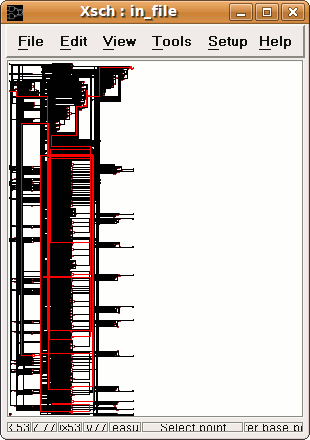| vlsitechnology.org /2LM sclib /synthesis /scripts /find_crit_path |
find_crit_path |
Chapter
Section
- multiplier netlist
- boog optimisation
- alliance synthesis
- input impedance
- output load
- library corrections
- carry cell effect
- min drive strength
- logic macros
- using boog macros
- using loon macros
- summary so far
- estimated wireload
- fastest netlist
- fanin reduction -1
- fanin reduction -2
- looping loon
- directory structure
- bugs & workarounds
- useful scripts
- summary
Use
find_crit_path input_file
Description
Script uses the information in files input_file.vst and input_file.xsc to print out the netlist critical path. It follows the red line that shows the critical path in XSCH.
Arguments
input_file
The structural VHDL netlist input_file.vst and XSCH timing file input_file.xsc.
Depends on
The GNU Project's implementation of the AWK programming language gawk rather than a really old version mawk which is shipped with some Linux distributions (esp. Ubuntu). To check,
1 $ which awk /usr/bin/awk 2 $ ls -gG /usr/bin/awk | cut -f4-8 -d' ' 2007-01-28 14:24 /usr/bin/awk -> /etc/alternatives/awk 3 $ ls -gG /etc/alternatives/awk | cut -f4-8 -d' ' 2007-12-05 20:51 /etc/alternatives/awk -> /usr/bin/gawk |
Bugs
Doesn't handle irregularities in the vst or xsc files gracefully.
Needs a clean VHDL file syntax as produced by LOON.
Operation
Script find_crit_path identifies the critical output net as the one coloured red in the xsc file, or 32 in field 3. Afterwards the path is traced backwards through instance names which are also coloured red. Each instance is labelled with its delay, and by grepping through the instance names we can pick up the cell and net names along the critical path, as shown below.
The fanout of each instance along the critical path is calculated from the netlist by simply counting the number of occurences of the net name string.
The rest of the script is concerning with formatting details to produce a result like the one in the example on the right.
$ grep '^C' in_file.xsc C:r 15:32:3493 ps C:y 1:32:526 ps $ grep -n 'r 15' in_file.xsc 669:N:r 15:-1:3493 ps 2485:C:r 15:32:3493 ps 2521:P:r_15_ins_q:r 15:r 15:32:416 ps $ grep -n ':r_15_ins_q:' in_file.xsc 1332:B:r_15_ins_q:32:3493 ps 2520:P:r_15_ins_nd:r_15_ins_nd:r_15_ins_q:32:416 ps 2521:P:r_15_ins_q:r 15:r 15:32:416 ps $ grep -n ':r_15_ins_nd:' in_file.xsc 671:N:r_15_ins_nd:-1:3312 ps 1333:B:r_15_ins_nd:32:3312 ps 2519:P:a2_x2_15_ins:a2_x2_15_sig:r_15_ins_nd:32:416 ps 2520:P:r_15_ins_nd:r_15_ins_nd:r_15_ins_q:32:416 ps $ grep -n ':a2_x2_15_ins:' in_file.xsc 1337:B:a2_x2_15_ins:32:3232 ps |
| Download find_crit_path | |
| Example | |
$ ./find_crit_path in_file # y 1 23 526 # 1 inv_x8 41 i->nq 718 192 not_y_1_ins not_y_1 # 2 no2_x1 1 i1->nq 805 87 no2_x1_254_ins no2_x1_254_sig # 3 xr2_x1 1 i0->q 921 116 xr2_x1_302_ins xr2_x1_302_sig # 4 nxr2_x1 1 i0->nq 1023 102 nxr2_x1_20_ins nxr2_x1_20_sig # 5 no2_x1 2 i1->nq 1143 120 rtlcarry_6_3_ins rtlcarry_6_3 # 6 oa2ao222_x2 4 i4->q 1327 184 rtlcarry_6_4_ins rtlcarry_6_4 # 7 oa2ao222_x4 9 i4->q 1562 235 rtlcarry_6_5_ins rtlcarry_6_5 # 8 noa2ao222_x1 4 i1->nq 1785 223 not_rtlcarry_6_6_ins not_rtlcarry_6_6 # 9 noa2ao222_x4 6 i1->nq 2044 259 rtlcarry_6_7_ins_nq rtlcarry_6_7 # 10 oa2ao222_x2 5 i4->q 2250 206 rtlcarry_6_8_ins rtlcarry_6_8 # 11 oa2ao222_x4 6 i4->q 2448 198 rtlcarry_6_9_ins rtlcarry_6_9 # 12 oa22_x4 6 i1->q 2669 221 rtlcarry_6_10_ins rtlcarry_6_10 # 13 nxr2_x1 1 i0->nq 2772 103 nxr2_x1_9_ins nxr2_x1_9_sig # 14 o2_x2 1 i1->q 2885 113 o2_x2_ins o2_x2_sig # 15 oa2ao222_x2 1 i4->q 3023 138 oa2ao222_x2_ins oa2ao222_x2_sig # 16 noa22_x1 2 i1->nq 3136 113 rtlcarry_0_13_ins rtlcarry_0_13 # 17 a2_x2 1 i0->q 3232 96 a2_x2_15_ins a2_x2_15_sig # 18 na2_x1 1 i1->nq 3312 80 r_15_ins_nd r_15_ins_nd # 19 nxr2_x4 0 i0->nq 3493 181 r_15_ins_q r(15) # r 15 # # 1st critical path is r 15 at 3493 # 2nd critical path is r 14 at 3472 | |
|
 |